If you've been reading this blog for a while, you've probably realized by now that I'm of the opinion that there are lots of things most frisbee teams aren't doing very well.
But, most of the time, there's an unwritten asterisk to that belief: *usually the very best teams are pretty good at this stuff. But that's not always the case.
There’s been a lot of discussion around Portland Rhino Slam!'s performance in their 15-6 win in the 2024 national championship. But what stands out to me watching the highlights of that game is...New York PoNY's help defense kinda sucked. There were a number of times a Rhino cutter caught a huck after starting their cut 5 yards further from the endzone (or more!) relative to potential PoNY help defenders.
In some online communities, the term "alpha" has been borrowed from the world of finance refer to a competitive advantage that hasn't been completely competed away by everyone involved in the game (or market, etc) being aware of the same trick. For example, if everyone knows investing in Apple is a smart decision, lots of people will buy Apple stock & the price will inevitably rise until it's no longer a smart decision, and is just an...average decision. There’s no alpha left in buying Apple stock. Similarly, if everyone was amazing at playing help defense, there wouldn’t be much advantage to be gained by being good at it yourself. Being good at it won't make you stand out, it will just make you...average.
But, as we'll see below, there's still alpha in help defense. You can still play better defense than a national-championship-game-level team if you're elite at help defense.
I see hints that maybe goading Rhino to throw deep was a calculated risk by PoNY that went spectacularly wrong. There are a few times in the clips below where PoNY defenders could have orbited around to the deep side of a Rhino cutter, but chose not to. But I struggle to convince myself it was all just an error of high level strategy—hence this article. And smart help defense can improve your performance no matter what your overall strategy is.
Let’s look at some of Rhino’s successful deep throws:
Huck #1:
A early game huck to club Player of the Year Raphy Hayes gains 70 yards. A potential PoNY help defender was ~10 yards deeper when Hayes started his cut. And he wasn't even, like, off to the side, either. He was pretty much directly on the deep side of Raphy's cut:
I won't discuss every play below in detail—my comments on all of them would be pretty similar anyway—but I want to do so for this one. If I were in the place of that potential help defender, here's how I would be making decisions on defense:
Recognize skill: Raphy Hayes is one of Rhino's top stars, a centerpiece of their offense. The player I'm guarding, while certainly no slouch1, is marginally less of a threat.
Recognize activity: The player I'm guarding is not actively looking to get the disc—so I'm going to divert a little bit of my attention to notice how Hayes, in the middle of the field, is starting an explosive cut. I'll be ready to help if I see he's generated separation.
Recognize traffic: Even if "my" assignment were to cut under at the moment of the screenshot above, he'd be cutting right towards two defenders and one offensive player. Far from the biggest threat to break our defense apart.
Recognize threats: a wide-open 70-yard gain is a much bigger threat than a 10-yard under when the offense is 75 yards from scoring. This, in my mind, is the biggest reason why I’m always ready to help deep.
One other thing comes to mind re-watching this play for the Nth time: on a cut like this, you have to train your brain to help when the cutter gets open, and not wait until the throw goes up. The defender actually does end up running deep, but only after the throw is released, when it’s far too late. Committing to that help earlier—at the moment Raphy gets open—could have discouraged the pass and made Rhino work much harder on that possession.
I try to be kind in my writing, but at the same time, I try to be honest so readers can learn clear lessons about what good frisbee does and doesn't look like. And I’m going to err on the side of being honest here (I think these PoNY boys can take it): to me, this is bad defense. Nonexistent help defense like this would've gotten me yelled at and benched when I was a sixteen year old playing high school basketball. The best ultimate players in the world ought to be able to easily meet those same expectations.
Huck #2:
Another huck to Raphy Hayes just a few minutes later. Not as egregious as example #1 but there was still a defender 5 yards deeper than Raphy when he started his cut:
Huck #3:
Once again there's a potential help defender who is, at one point, 10 yards deeper than the cutter who ends up catching the disc in the endzone:
Huck #4:
PoNY comes out of half down 8-3 and...continues to let Rhino throw deep shots to cutters who could've easily been covered by defensive help:
Huck #5
I love this sequence from Mica Glass. He:
catches an under
immediately throws a dump pass without ever turning upfield
then immediately spins and cuts deep for a huge gain
Dylan Freechild-esque. Add this trick to your bag immediately.
The PoNY help defense once again had a 10-yard head start to the deep space. One defender did peel off to help deep, but they were far too late in recognizing the need to help.
(The other highlight of this clip: Announcer Keith Raynor saying "PoNY's starting to sag in the lanes, and it's doing a good job keeping Rhino from being able to use the threat of their deep throws" ...exactly as Rhino releases another completed huck.)
A few other Rhino Slam! hucks
The above hucks were the most obvious examples of opportunities for better help defense from PoNY. For completeness, here are the other hucks Rhino completed in the championship game.
#6: Another huck to Raphy Hayes. There were two defenders about 5 yards deep of Hayes and a bit to the side when he started his cut. I think there's some opportunity to help, but definitely not as egregious as, e.g., example #1 above. I especially think the defender on the "top" sideline should've looked to help much quicker. They're guarding a person who's ~40 yards from the disc and standing next to the sideline. There's no reason to be so close! They eventually peel off to help—but are far too late:
#7: The first point of the game was a score on this Rhino huck. No opportunity to play help defense here. Personally, I would've tried harder to discourage deep looks when I know I'm the deepest defender (and there's some congestion underneath), but maybe that's just PoNY's strategy:
#8: Another nice huck by Mica Glass. There wasn't really an opportunity for help defense here. But, one thing really confuses me about this sequence. The two defenders on the bottom of the screen are doing exactly what I would've done in this situation: playing bracketing/poachy D. But the two defenders on the top of the screen totally miss the opportunity to play the same way and get burned deep:
#9: As I said in the introduction, it seemed at times that PoNY was encouraging Rhino to throw deep and just badly miscalculated whether that was a smart strategy. Here, the defender has lots of time to reposition but chooses to stay on the under side and is unable to stop a good deep throw:
Final thoughts
First of all, a big thanks to emf's Rhinos are Sexy highlight video for making it so easy to find these examples.
Clearly Rhino had some luck on their side in this game. None of their hucks were uncatchable, and the jump balls were all won by Rhino. But PoNY had the opportunity to make their own luck with better help defense, and totally whiffed.
I think that after all the content I've seen online about smart poaching—including smart poaching by PoNY—I was starting to assume that all the top level teams played really good defense. But now, I'm not so sure. Now, I'm thinking there's still alpha in help defense.
In fact, #42 Will Lohre had the second-most goals on Rhino at Nationals.
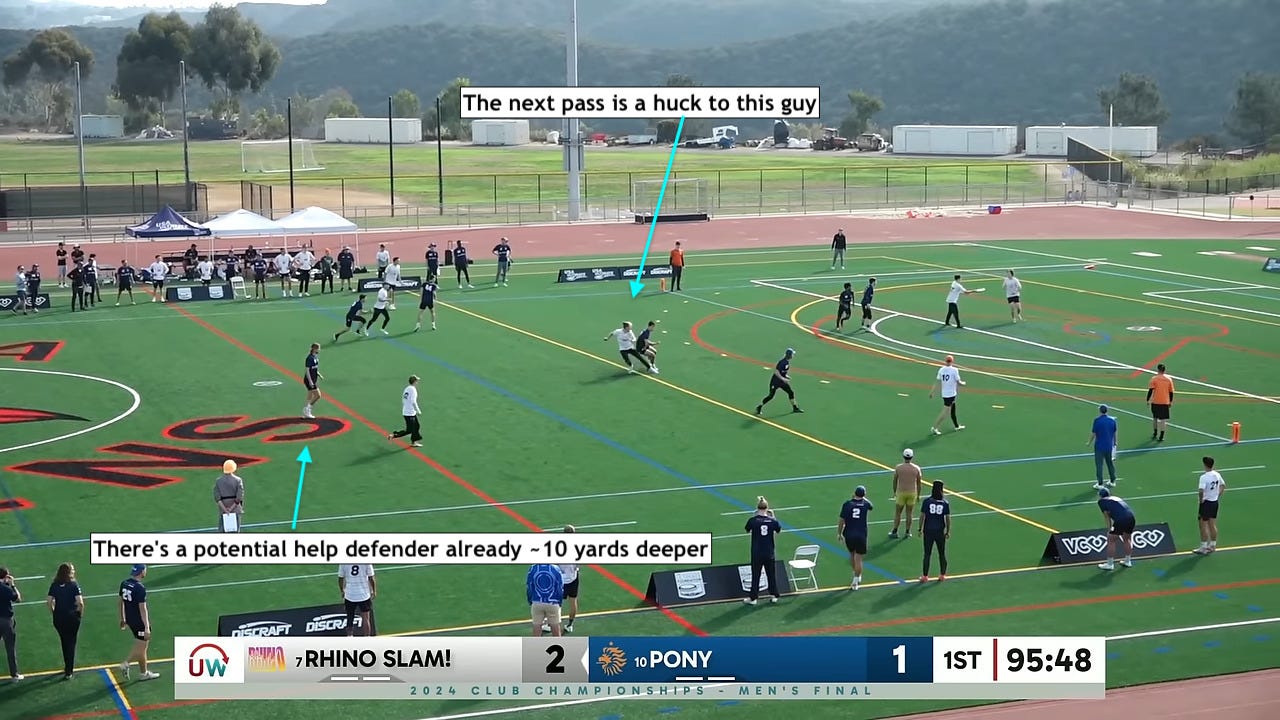

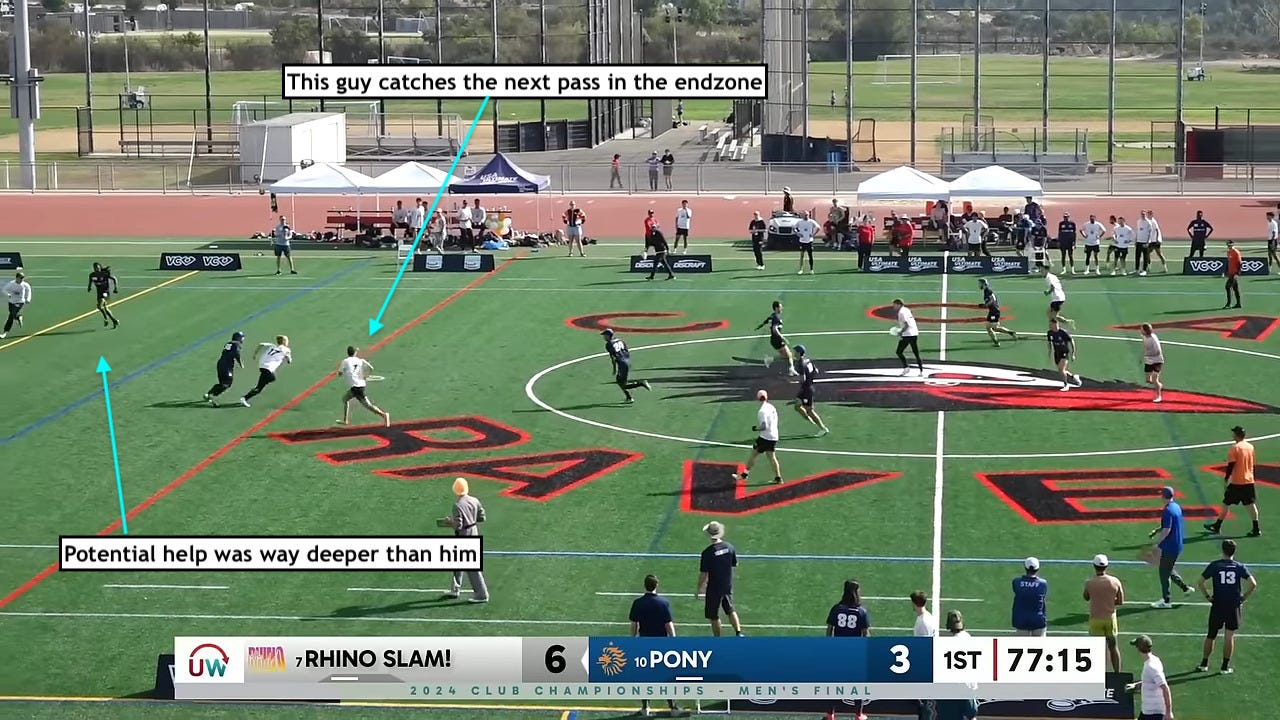
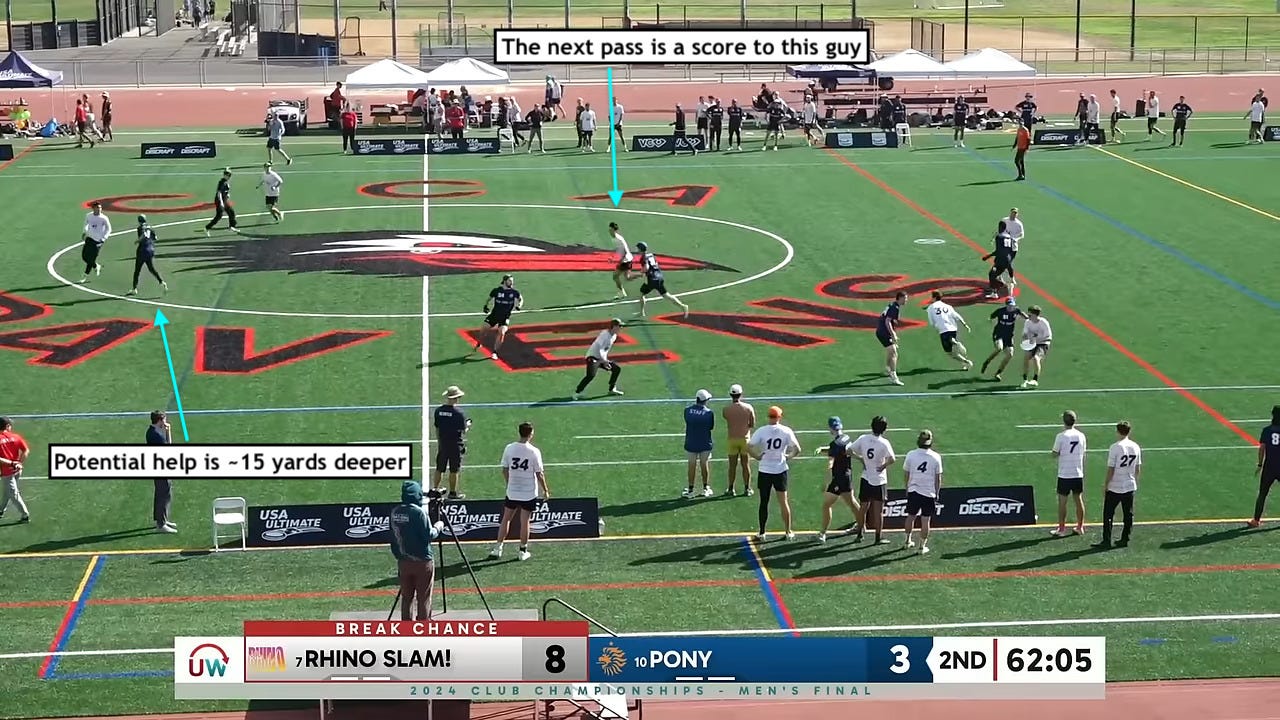
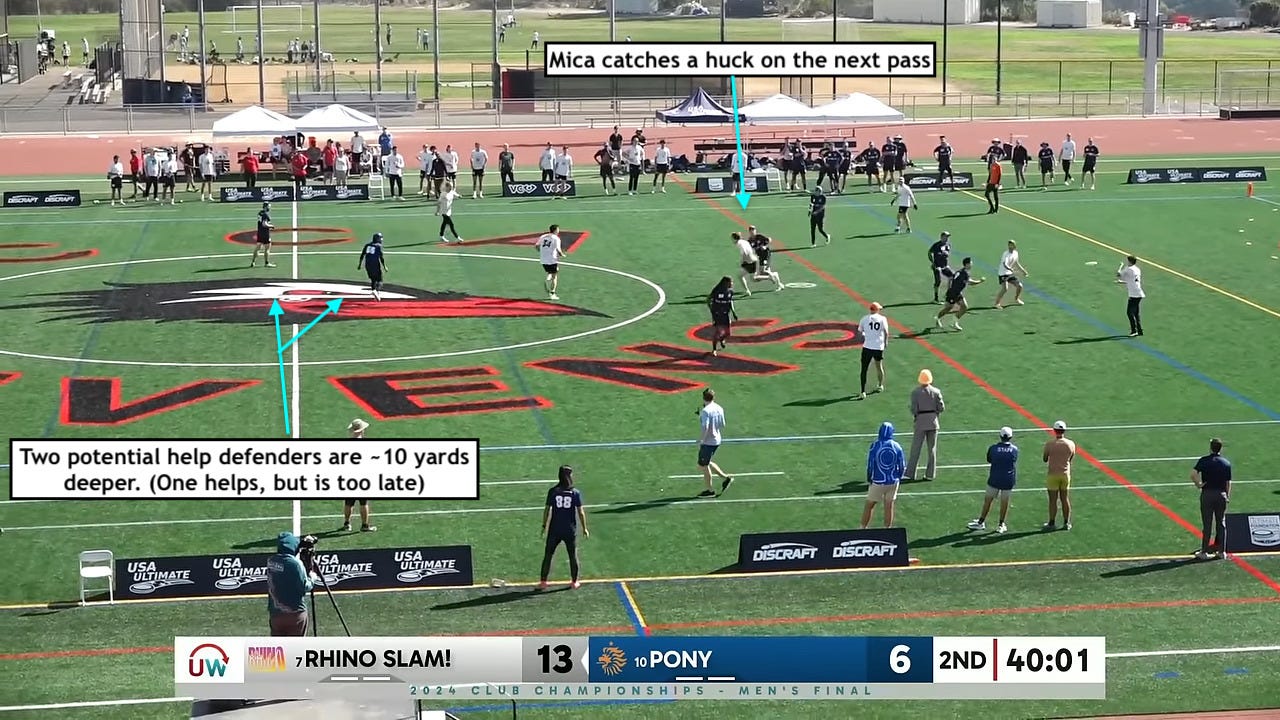
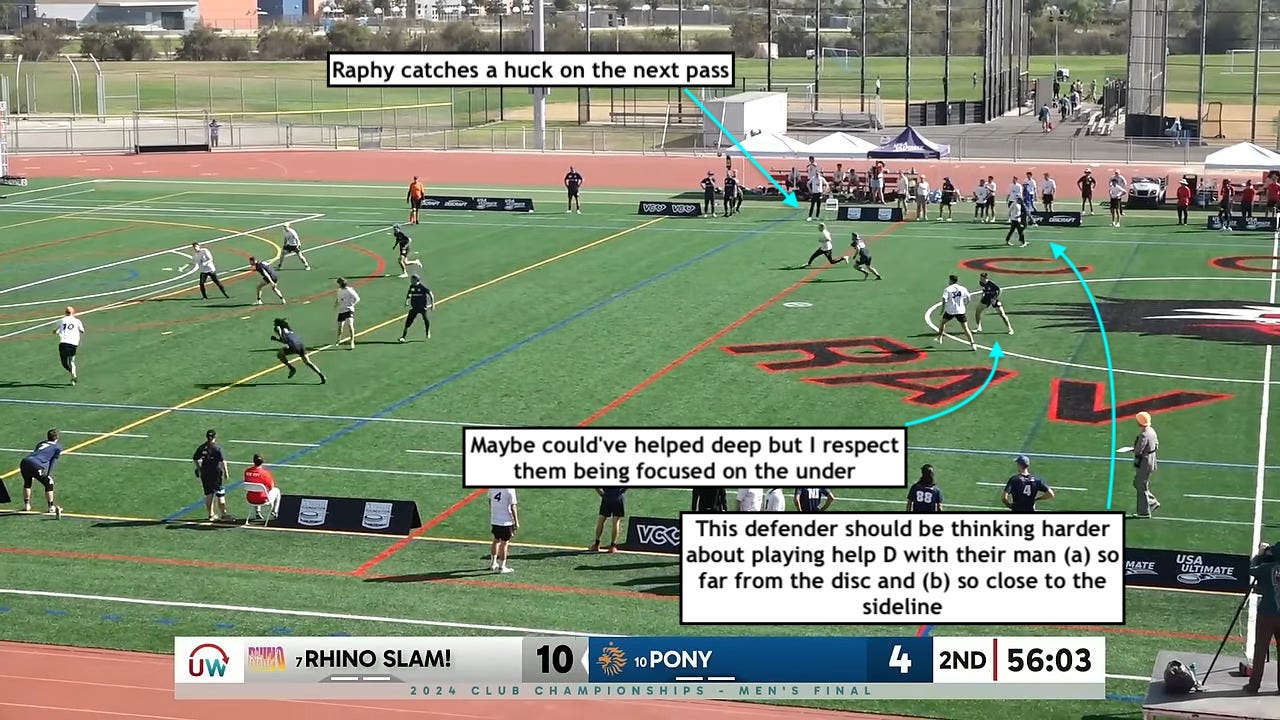
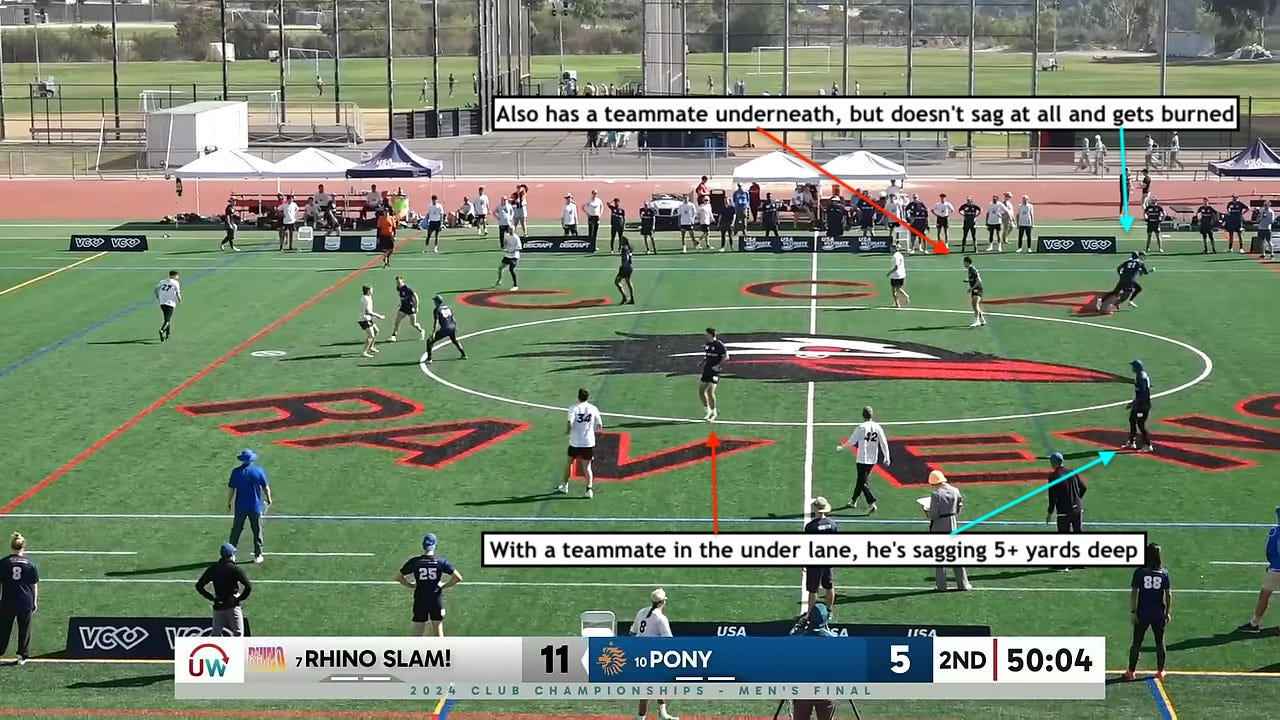
Great post as always. Just wanted to appreciate your use of "orbit"! =)
The 4 'recognize' statements echo something I have drafted at present and I really like the way you have phrased these. My current version is Stop the Threat -> Identify the options -> Understand the intent